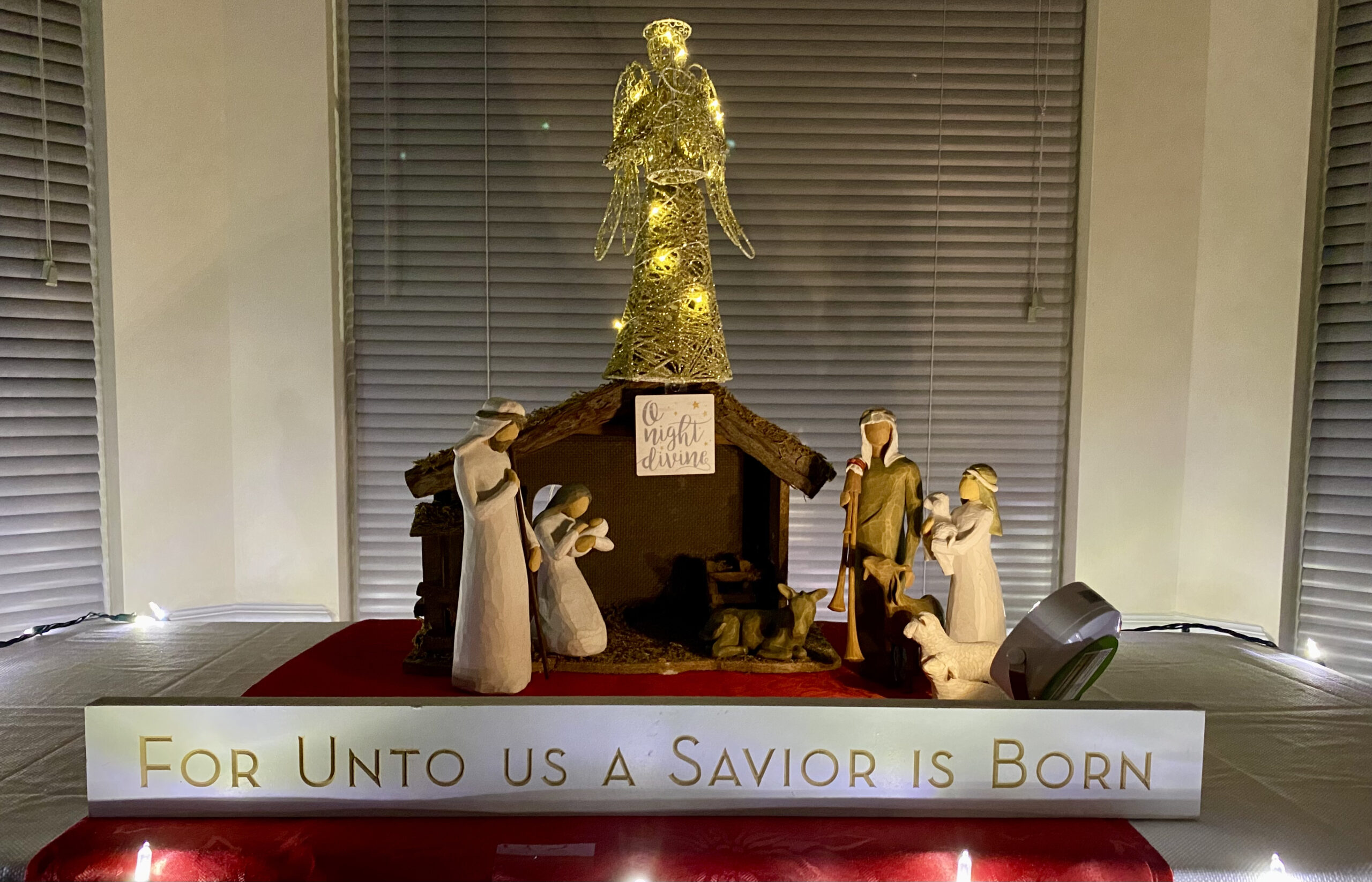
UPDATE 1: Minor additions have been included as of Dec 23, 2020.
UPDATE 2: Additional details related to Christmas have been included as of Dec 6, 2021.
With the advent of social media, it would seem there is no shortage of debate among Christians as to whether or not we should celebrate certain holidays. Usually the debate ensues because some Christians have a counter-culture worldview and assess that those particular holidays are too steeped in pagan tradition to be redeemed. So, with Thanksgiving right around the corner (and Christmas not too far behind), I’ll attempt to address this matter by providing my assessment of Halloween, Christmas, and Easter, with a brief post scriptum (P.S.) concerning Thanksgiving. It should be noted that I don’t have an agenda with this post other than to strive to express an opinion–one that I believe is biblical, while not going beyond what the Scriptures declare (see adiaphora).
Halloween
 The term “Halloween,” or All Hallows Eve, is believed to have originated in the 18th century on Oct 31, the day before All Saints Day (Nov 1). However, the customs seem to date back to a pagan festival where, according to one source, “Druids [of Gaul] believed that on this night ghosts and witches were most likely to wander about.”1 Vos further notes, “Gradually, Druid practices were merged with the Roman fall festival in honor of the goddess Pomona and the Christian feast day.”2 Some of the customs that surround this holiday are: Jack-o-lanterns,3 “trick or treat,” costume wearing, ghouls, ghosts, and candy consumption.
The term “Halloween,” or All Hallows Eve, is believed to have originated in the 18th century on Oct 31, the day before All Saints Day (Nov 1). However, the customs seem to date back to a pagan festival where, according to one source, “Druids [of Gaul] believed that on this night ghosts and witches were most likely to wander about.”1 Vos further notes, “Gradually, Druid practices were merged with the Roman fall festival in honor of the goddess Pomona and the Christian feast day.”2 Some of the customs that surround this holiday are: Jack-o-lanterns,3 “trick or treat,” costume wearing, ghouls, ghosts, and candy consumption.
I would love to provide a clear, irrefutable statement on the origin of Halloween, but my research did not provide clear-cut evidence. What I know is that the holiday is antiquated and has pagan association, but also some degree (however unclear) of Catholic influence. As Slick summarizes, “[the] origins of Halloween are a mixture of old Celtic pagan rituals, superstition, and early Catholic traditions.”4 At best, Halloween is closely tied to pagan “days for the dead,” or common celebrations for dead beings through various places and cultures throughout history. Yet, that is hardly the approach for who celebrate it today. In this regard, Halloween starts out evil, but, in today’s society, has become a caricature of itself that typically avoids deliberate pagan practices in favor of candy (and for some, alcohol) consumption with costume dress-up ranging from “playful, child-like” to “provocative, sensual” (and likely sinful).
Verdict:
Generally, Christians fall into one of a few categories with regard to Halloween:
- (A) celebrate it without compromising their Christian ethics,
- (B) avoid celebrating by avoiding all participation,
- (C) celebrate it in a limited capacity (i.e. only to the extent that Christ is promoted or within a church setting), or
- (D) celebrate Reformation Day instead.5
Can a Christian celebrate Halloween? While I do not recommend it and I believe this one has little redemptive value (apart from sharing the Gospel with the unsaved), I don’t believe this is a salvation matter. Christians, passionate on both sides, should extend grace to one another provided no Christian is invoking the demonic realm through occult activities on Halloween.6 The Halloween celebrator should be mindful of those who may have come from the occult and steeped in divination. The anti-Halloween Christian should be cautious of a sort of elitism or Phariseeism.7 8
Christmas
 It’s often suggested that Christmas and many of its customs are not very “Christian” in origin. To some degree, this is true (visit Answers In Genesis here for a great breakdown of what is and isn’t Christian about Christmas). Traditions such as Christmas trees, gift-giving,9 yule logs, etc. are likely pagan in origin and were included in Christmas likely as an effort to Christianize some elements of the Roman festival Saturnalia. Though periodically celebrated, the early church didn’t place much significant of the birth of Christ.10 11 By the 4th century, however, with the Eastern church celebrating Jesus’s birth around Jan 6 (Epiphany), the Western church began to infuse elements of the pagan holiday with a celebration of the birth of Christ.12 13 One solid alternate explanation for the infusion of pagan themes into the holiday is that Christians were suffering intense persecution and death in the first few centuries under Roman rule. It’s quite possible that they elected to purposefully masquerade and blend Saturnalia with a celebration of Jesus’s birth in order to have an avenue to celebrate Christ that would go unnoticed by their persecutors.14
It’s often suggested that Christmas and many of its customs are not very “Christian” in origin. To some degree, this is true (visit Answers In Genesis here for a great breakdown of what is and isn’t Christian about Christmas). Traditions such as Christmas trees, gift-giving,9 yule logs, etc. are likely pagan in origin and were included in Christmas likely as an effort to Christianize some elements of the Roman festival Saturnalia. Though periodically celebrated, the early church didn’t place much significant of the birth of Christ.10 11 By the 4th century, however, with the Eastern church celebrating Jesus’s birth around Jan 6 (Epiphany), the Western church began to infuse elements of the pagan holiday with a celebration of the birth of Christ.12 13 One solid alternate explanation for the infusion of pagan themes into the holiday is that Christians were suffering intense persecution and death in the first few centuries under Roman rule. It’s quite possible that they elected to purposefully masquerade and blend Saturnalia with a celebration of Jesus’s birth in order to have an avenue to celebrate Christ that would go unnoticed by their persecutors.14
Verdict:
In short, those who will celebrate Christmas either do so based on tradition or because they see no problem with celebrating the birth of Christ despite possibly re-purposing pagan ideas (by that measure, even our days of the week are pagan). Beyond that, while it seems some customs of Saturnalia were adopted in the celebration of Christmas, various historians date the pagan festival as starting on 17 December with a 3-7 day celebration, which means by even the most liberal dating, it ended before 25 December15 16 (i.e., Christmas is not celebrated in lieu of Saturnalia). Moreover, there is biblical precedent for giving God praise for the advent of the Messiah (Lk 2:12-14) and even freedom to esteem such a day (Rom. 14:5), yet there is no command. Those who don’t celebrate either do so based on tradition or because they take issue with applying new meaning to possibly pagan-rooted customs. Such a stance is perfectly acceptable, too. Then, there are others that enjoy the Christian elements of Christmas like carols and kindness, enjoy the celebration of Christ’s Immaculate Conception in order to save sinners, and simply avoid the unpalatable elements of the holiday. Further still, there are religious sects that celebrate Advent (which includes and surrounds Christ coming into the earth) but tends to be a month-long celebration with more biblical emphases on Jesus’ purpose. Again, the main point is that Christians are free to celebrate Christ any day and every day, but if Christmas is problematic for you, you shouldn’t celebrate it. Christians, however passionate they are on this celebration, should not allow this to be a divisive matter among themselves, for it’s not a matter of salvation, and no Christian is sinning by not participating in Christmas.
Easter
 In identifying this holiday with the Resurrection of Christ, Easter would seem to be the most doctrinally-critical holiday the Christian possesses (although there is no biblical instruction to celebrate “Easter”). Yet, surely you’ve been told just how pagan this holiday is, right? Wrong. Sure, the eggs, rabbit, and word, “Easter,” would seem to have pagan associations, but that doesn’t necessarily make the celebration pagan.
In identifying this holiday with the Resurrection of Christ, Easter would seem to be the most doctrinally-critical holiday the Christian possesses (although there is no biblical instruction to celebrate “Easter”). Yet, surely you’ve been told just how pagan this holiday is, right? Wrong. Sure, the eggs, rabbit, and word, “Easter,” would seem to have pagan associations, but that doesn’t necessarily make the celebration pagan.
First, as early as the second century, Christians were used to celebrating “Easter,” as it was a common time to schedule baptism.17 Second, the word, “Easter,” is “thought to derive either from the name of an obscure Germanic goddess of the spring, Eastre […], or more likely, from an old German root for dawn or east (the time and place of the rising sun).”18 Moreover, the earliest disputes regarding Easter had to do with the timing of it according to Roman-Jewish calendar.19 As Bishop highlights, “Originally Easter was a unitary night celebration (like Passover) recalling both the death and resurrection of Christ.”20
So, if the early church celebrated the resurrection and made it a notable time for one of the Christian ordinances, where does the pagan goddess Ischatar come in play? As Slick points out, this association is inaccurate. The Greek word in the Bible is pascha as opposed to Ishtar or Eostre or Easter and this pascha point to the OT Passover.21
Verdict:
The resurrection of Christ is truly a hallmark of Christianity. Paul reminds us in 1 Cor. 15:12-19 that without the resurrection of Christ everything we do is vanity; we have no pardon for sin, and we are fools for believing this Messiah. So, as critical as the resurrection is to our faith, one would think the Christian must celebrate it, right? Not quite. Christians must believe the resurrection, profess it, and should give thanks to God for raising Christ for our justification (Rom. 4:25), but nowhere in Scripture do we find an instruction to celebrate it as a holiday or festival.
In closing, bunnies and colored eggs, though cute and fun, simply detract from a time of celebration of the resurrected Lord. I cannot envision the early church consciously doing anything that would diminish this joyous celebration and what it means for guilty sinners. For those who don’t want to celebrate it, just know there seems to be more evidence to support Christian-based origins than one could surmise from Christians’ social media posts and memes that condemn Easter as pagan. For those Christians with concerns regarding the word, “Easter” and pagan associations, keep in mind that we have many pagan words that are used regularly without ever appropriating a single thought to the pagan god or goddess the word represents.22
Biblical Application for Holiday Celebration
While I don’t think these matters should be as big of a deal as usually seems, I do believe the Scriptures provide guidance. As noted earlier, this matter falls into the category of adiaphora, which comes from the Greek meaning “things indifferent” and refers to things that, according to Scripture, aren’t commanded or prohibited.23
One could argue there’s no clearer example of adiaphora in the Bible than Paul’s declaration on food sacrificed to idols. On this topic, the Apostle Paul offers some useful guidance that has application in various areas of Christian life. 1 Cor. 8 and 1 Cor. 10:14-33 provide wise insight on how we can handle matters like whether or not to celebrate a particular holiday.
In the first reference (1 Cor. 8), Paul deals with Christians eating food that, evidently, was once offered sacrificially as part of some pagan idolatry. Some Christians were greatly troubled when witnessing other Christians eat this food that once had pagan intention. To this matter, Paul intimates what some Christians believed concerning the meat offered to idols. That is, the idol is nothing and main concern for the Christian eating the sacrificial meat was to be sure that eating this food did cause difficulty in the faith for the Christian who’d be easily offended and discouraged at this notion. Notice here, Paul doesn’t describe the eating of “pagan” meat as sin, but rather declares the Christian’s sin is against his brother due to his refusing to forfeit his liberty for their conscience sake (vv.11-12). So, what’s the bottom-line application for this passage? Consider your brothers and sisters in Christ when it comes to controversial issues that cause offense. Be willing to give up your comforts and freedoms for the sake of your brothers.
With regard to the second biblical passage mentioned, Paul further addresses the formerly mentioned sacrificed food. Here, however, he makes it clear that Christians should not knowingly eat food offered to idols, for though the idols are nothing, to knowingly participate in any form of idolatry would invoke God’s anger, just as Israel’s idolatry in the OT kindled God’s wrath. To summarize, W. Harold Mare, in his commentary on this passage says, “First, though the Christian has the right to do all things, such as eating sacrificial meat, it may not be beneficial to themselves. Second, such practices of liberty may not in fact build up a fellow Christian. Third, in summary Paul teaches that Christians are not merely to seek their own good but to promote the good of their fellow Christians.”24
I’m certain the above mini-treatise will not resolve this matter for all Christians. I think it comes down to whether or not these holidays being celebrated are viewed as adiaphora. If we are convinced this is not a salvific issue, then we must concede that our traditions and enjoyment of various activities like holiday celebration must come secondary to our willingness to honor God through self-sacrificing love for our brothers in Christ.
Final Verdict (Conclusion)
Christians vary greatly in the celebration of these three holidays and in theirrelative passions behind their convictions. Some celebrate none of these, a couple of these, or all three of these with varying degrees of activity and fervor. This most likely stems from individuals’ or churches’ approach to interacting with the culture. Are they “against the culture” and seek a Christian separation from all things? Are they “of the culture” and merge cultural good with Christianity? Are they “transforming culture” and seek to redeem all things in the world for the Lord?25 In the end, every day belongs to the Lord (Ps. 24:1), and ultimately, Christians should be most concerned with making sure the Lord is honored when they elect to celebrate (“esteem”) a holiday or elect not to do so (Rom. 14:5-6).
P.S.—A Note on Thanksgiving Day
This is the lone holiday that is undoubtedly God-oriented, if not outright Christian. Whether one regards U.S. Thanksgiving Day as tied to the Pilgrims at Plymouth or the declaration of it as a national holiday in the 19th century, Thanksgiving is a time of giving thanks to God for harvest and all that we possess. Interestingly enough, though tied to God it doesn’t usually yield controversy like the previous holidays. It’s generally well-received by even today’s society (likely because it doesn’t demand the unrepentant sinner to adjust his lifestyle in any fashion or surrender to Another), so most don’t think twice about the Christian nature of Thanksgiving.
The concept of thanksgiving is not to be relegated to a particular day for the Christian; rather, it is meant to be a lifestyle for us. Think about it, there is no other group that can appreciate thanksgiving quite like Christians. We appreciate God’s creation and acknowledge Him as God. The Christian sees the value in the Lamb of God (Christ). The Christian knows his sins are utterly opposed to God and thus, the grace of God. The Scriptures declare, “But thanks be to God, that you who were once slaves of sin have become obedient from the heart to the standard of teaching to which you were committed, and, having been set free from sin, have become slaves of righteousness” (Rom. 6:17-18 ESV). So, it is only the Christian who can appreciate the transforming power of God and give Him thanks (no credit to oneself) for such a gracious work in their lives.
More plainly, 1 Thess. 5:18 reads, “Give thanks in all circumstances; for this is the will of God in Christ Jesus for you.” God is desirous that we are a people of “thanksgiving,” not merely an occasionally thankful people. So as you prepare to enjoy your Thanksgiving day, remember the mindset for the Christian is to be regarded, not every 4th Thursday of November, but every day.] 
1. H.F. Vos, “Halloween,” Evangelical Dictionary of Theology, edited by Walter A. Elwell (Grand Rapids, MI: Baker Academic, 2001), p.533.
2. Ibid.
3. Matt Slick, “Halloween,” Christian Apologetics Research Ministry, https://carm.org/halloween (Last accessed Dec 4, 2015). Slick notes the Jack-O-Lantern is from Irish folklore about a man named Jack who had an interesting encounter with the devil and had to carry a candle around to light his way because he could not go to Heaven or Hell.
4. Ibid.
5. Robert Rothwell, “What is Reformation Day All About?” Ligonier Ministries, http://www.ligonier.org/blog/what-reformation-day-all-about/ (Last accessed Dec 24, 2015).
6. Galatians 5:19-21 ESV, “Now the works of the flesh are evident: sexual immorality, impurity, sensuality, idolatry, sorcery, enmity, strife, jealousy, fits of anger, rivalries, dissensions, divisions, envy, drunkenness, orgies, and things like these. I warn you, as I warned you before, that those who do such things will not inherit the kingdom of God.” Sorcery is included in this vice list as a “work of the flesh.” Divination and the like are condemned in both the Old and New Testaments.
7. H. Armin Moellering, “Long live Halloween,” Concordia Journal 17, no. 4 (October 1991): 374-376. ATLASerials, http://search.ebscohost.com.ezproxy.liberty.edu:2048/login.aspx?direct=true&db=a6h&AN=ATLA0000844741&site=ehost-live&scope=site (accessed December 4, 2015). Moellering notes the concept of Phariseeism for non-celebrators saying, “One danger I see is that of fomenting a spirit of Halloween Phariseeism: ‘I thank God that I am not like other people who celebrate Halloween.’ ”
8. It is worth noting, the church of Satan encourages today’s practices of Halloween as it supports the central motif of their movement: do whatever pleases the self.
9. Gift-giving has both pagan roots and association with gifts of the Magi. I could not find definitive proof of which one was linked into Christmas.
10. O.G. Oliver Jr., “Christmas,” in the Evangelical Dictionary of Theology, edited by Walter A. Ewell (Grand Rapids, MI: Baker Academic, 2001), p.238-239.
11. Nick Needham, 2000 Years of Christ’s Power, Volume 1: The Age of the Early Church Fathers (London, England, U.K.: Grace Publications Trust, 2016), p.196.
12. Everett Ferguson, Church History Volume 1: From Christ to Pre-Reformation (Grand Rapids, MI: Zondervan, 2005), p.252-253.
13. While not impossible, it was unlikely that Jesus was born on December 25. This should not be too disheartening, however. Many people in American culture elect to celebrate their birthday on a day different from the actual date as a matter of convenience or to coincide with the nearest weekend. This is not to say that Christians should see the “birth” of Jesus in the same light as their own (it’s not!). Jesus came into the world, but His earthly advent was not His origin. His birthday is not a mere annual celebration of life as ours is. Instead, it is a celebration that points to Immanuel (God with us) coming to the earth to redeem man from his sins.
14. While this idea isn’t explored in any detail, the New English Translation (NET) Bible, 2nd edition Notes, as of Dec 23, 2020 (access date), relates a footnote on Luke 2:8 regarding the shepherds who received the angels’ proclamation of Christ’s birth. A section of the footnote reads, “Some think that the reason for celebration on this date was that it coincided with the pagan Roman festival of Saturnalia, and Christians could celebrate their own festival at this time without fear of persecution.”
15. Nick Needham, 2000 Years of Christ’s Power, Volume 1: The Age of the Early Church Fathers (London, England, U.K.: Grace Publications Trust, 2016), p.196.
16. Saturnalia | Celebration, Sacrifice, & Influence on Christmas. Encyclopedia Britannica. https://www.britannica.com/topic/Saturnalia-Roman-festival (Last accessed Dec 6, 2021).
17. Everett Ferguson, Church History Volume 1: From Christ to Pre-Reformation (Grand Rapids, MI: Zondervan, 2005), p.149.
18. R.K. Bishop, “Easter,” in the Evangelical Dictionary of Theology, edited by Walter A. Elwell (Grand Rapids, MI: Baker Academic, 2001), p.361.
19. Ibid.
20. Ibid.
21. Matt Slick, “Is Easter named after Ishtar?” Christian Apologetics Research Ministry, https://carm.org/is-easter-named-after-ishtar (Last accessed Dec 4, 2015).
22. Ibid. Slick notes that the Old English, Thursdæg, literally means Thor’s day; related to Old High German. Each day of the week derives names from pagan gods.
23. Donald K. McKim, Westminster Dictionary of Theological Terms (Louisville, KY: Westminster John Knox Press, 1996), p.4.
24. W. Harold Mare, “1 Corinthians,” The Expositor’s Bible Commentary, Volume 10: Romans Through Galatians, edited by Frank E. Gaebelein (Grand Rapids, MI: Zondervan Publishing House, 1976), p.252.
25. These approaches reflect was a common way of viewing culture, as taught in my seminary’s apologetic course. It was popularized by H. Richard Niebuhr’s book, Christ and Culture.